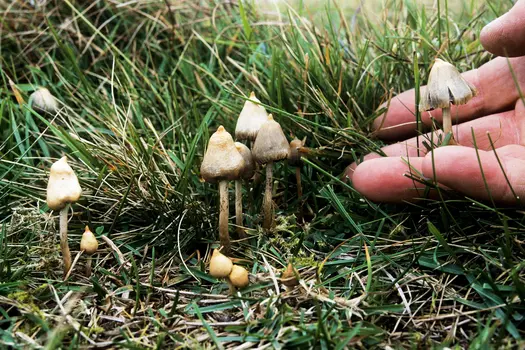Oct. 26, 2021 -- Can psychedelic medications treat depression in cancer patients? Yes, suggest the results from a recent clinical trial on this very topic.
Aquilino Cancer Center in Rockville, MD, on Wednesday announced promising new results in a clinical trial for the use of psychedelic medications to treat depression in cancer patients. The treatment, psilocybin-assisted psychotherapy, combines a single 25-milligram dose of psilocybin -- otherwise known as magic mushrooms -- with several hours of psychotherapy before, during, and after the “dosing.”
In the clinical trial, each magic mushroom dosing session lasted about 8 hours and took place in a quiet room with a therapist. During the session, participants wore headphones with carefully curated music and custom eye shades that completely blocked light.
Lead researcher Manish Agrawal, MD, of Maryland Oncology Hematology at Aquilino, reported that 50% of participants in the study were in complete remission from their depression 8 weeks after their dosing session. What’s more, 80% of participants saw at least a 50% drop in their depression scores. (The trial measured depression with the Montgomery-Åsberg Depression Rating Scale, or MADRS.)
Previous studies have found magic mushroom-assisted therapy improved mental health scores in people with end-of-life anxiety and depression. The study done at Aquilino was different because it sought to measure clinically significant depression on a specific scale -- MADRS -- and also because some of the therapy took place in a group setting.
Agrawal, an oncologist, got involved with psychedelic therapies because he saw too many people fall into depression after a cancer diagnosis. He said he was “very encouraged” by these results and expects more detailed results later this year.
“This is not a small problem,” he said. “About a quarter of the 17 million people with cancer in the U.S. also have clinical depression -- that’s 4 million people.”
Psilocybin is the active ingredient in magic mushrooms, which, when combined with therapy, has shown great promise for treatment of a variety of mental health issues, including depression, anxiety, obsessive-compulsive disorder, alcoholism, and even smoking. Several universities, including Johns Hopkins, the University of California San Diego, and Imperial College in the U.K., are doing in-depth research on these emerging medications.
In fact, psilocybin is one of several psychedelic substances that scientists are studying for mental health treatment. Others include LSD, DMT (ayahuasca), and mescaline (peyote). Promising early results led the FDA to grant “breakthrough status” to some treatments, including psilocybin-assisted therapy for treatment-resistant depression and MDMA-assisted therapy for PTSD, which may be FDA-approved within 2 years.
